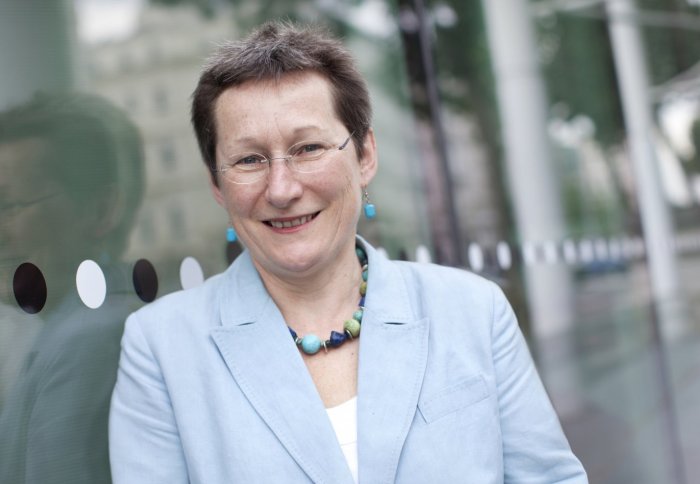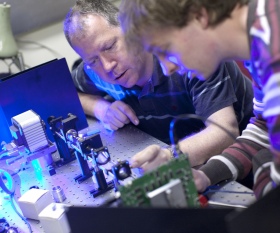A closer look at the Education Strategy

Professor Debra Humphris, the catalyst behind Imperial's first Education Strategy tells us why it was needed and what it means for students and staff.
Across the globe, higher education is undergoing a period of dramatic change. Students have more choice than ever before, new institutions are emerging, others continue to rise in the rankings and the delivery of education is being fundamentally rethought. Domestically too, higher tuition fees and a renewed emphasis on the student experience all contribute to a dynamic landscape.
It’s a situation that Professor Debra Humphris, Vice Provost (Education), argues we should embrace. “It really matters that we recognise the challenges and changes happening in the world,” she says. “No institution can stand still and let the world rush past them.”
A guiding philosophy
Within those manifold challenges are many opportunities, and it’s those that are of particular interest to Debra. Fortunately, capitalising on opportunity is something that she knows well, as evidenced by what she refers to has her ‘portfolio’ career.
'No institution can stand still and let the world rush past them'
– Debra Humphris
Originally trained as a nurse, Debra now holds a position on the senior team here at one of the world’s leading universities. In between, she’s worked for various medical and educational institutions, including St George’s Hospital Medical School and her previous employer, the University of Southampton.
Her position today means that she is responsible for overseeing the strategy for education across the entire College – from the activities of  Outreach, aimed at school children, through to the development of the next generation of research scientists. Debra’s passion for education comes from the first-hand experience she has witnessing the transformative effect that it can have on people’s lives. And in turn, that power of education is echoed in her ambitious vision for the College: “Our task is to prepare students to become great, radical, creative leaders of the next generation,” she says.
Outreach, aimed at school children, through to the development of the next generation of research scientists. Debra’s passion for education comes from the first-hand experience she has witnessing the transformative effect that it can have on people’s lives. And in turn, that power of education is echoed in her ambitious vision for the College: “Our task is to prepare students to become great, radical, creative leaders of the next generation,” she says.
Far and wide
So how do you even begin to craft a strategy with such lofty goals? A clue to the answer is provided by Debra’s description of her ideal day in the office. “I wouldn’t be in the office! My job is to be in other people’s spaces. There are such fantastic things people are doing across the Imperial community, and I won’t find that out by staying in these four walls,” she says, gesturing at her office surroundings.
The Union brings an essential perspective to what it’s like being a student in 21st century London
– Debra Humphris
And so the Strategy’s key ideas, driving questions, and overall priorities have come from corners far and wide – students, staff and alumni, as well as external groups like schools and employers have all contributed to the year-long project. “It’s vital to involve everyone who has a stake,” says Debra. “You use the energy and the wisdom that there is in the organisation, add in the external drivers and you try to create the conditions to let people be bold.”
One of the groups with whom Debra has worked closely is Imperial College Union. “For me it’s really important that we have a strong and engaging relationship with them,” she argues. “They bring an essential perspective to what it’s like being a student in 21st century London, living and getting by in a fast-paced city, studying hard and dealing with the day to day reality of student life.”
Building on the past
The Strategy itself contains a total of 24 action points across four key themes (see link), including the development of some new initiatives, like a plan to encourage students to return to their schools, colleges and employers in order to share their experiences of the College more widely.
'All of us in the College community play a role in the education and experience of our students'
– Debra Humphris
But it also includes a number of actions marked as ‘on-going’, meaning that they are fundamentally extensions of some of the many programmes already in place. This positioning is important: while the strategy provides a roadmap for the future, it also embodies Imperial’s long history of educational innovation. Recent examples include Imperial Mobile, the smartphone app that enables students to access information and services anywhere at any time and the Carbon Capture Pilot Plant, a unique hands-on education experience.
Debra has had an overwhelmingly positive response from staff she has approached for help. “Everybody has said yes!” she says. It is evident that both academic and professional staff will have a part to play in realising the longer term vision. “How somebody interacts with students in Registry, in Catering, in Halls or in Careers matters just as much as how a professor describes a vital concept in physics or civil engineering. All of us in the College community play a role in the education and experience of our students,” she says.
Article text (excluding photos or graphics) © Imperial College London.
Photos and graphics subject to third party copyright used with permission or © Imperial College London.
Reporter
Jessica Adams
Advancement